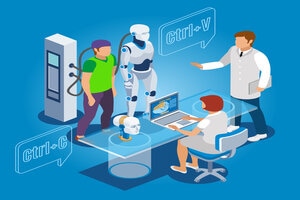


The stakes are high: patient safety, privacy, and trust are on the line.
Artificial Intelligence (AI) is revolutionizing healthcare, promising faster diagnoses, personalized treatments, and streamlined operations. Yet, with great power comes great responsibility. As we integrate AI into sensitive aspects of healthcare, we must address the ethical considerations surrounding its use. The stakes are high: patient safety, privacy, and trust are on the line.
This blog explores the key ethical challenges of AI in healthcare and offers insights into how they can be managed responsibly.
One of the primary goals of AI in healthcare is to improve patient outcomes. However, errors in AI algorithms can lead to incorrect diagnoses or ineffective treatments. Unlike human practitioners, AI systems lack contextual understanding, which can lead to critical mistakes.
Key Ethical Questions:
Potential Solutions:
AI thrives on data, but in healthcare, this data often includes highly sensitive patient information. Protecting this information is not only a legal requirement but also an ethical obligation.
Key Ethical Questions:
Potential Solutions:
AI systems are only as good as the data they are trained on. If the training data contains biases—such as underrepresentation of certain demographics—the AI system can perpetuate or even amplify these biases.
Key Ethical Questions:
Potential Solutions:
AI decisions can sometimes feel like a “black box,” where the reasoning behind an outcome is unclear even to its developers. In healthcare, this lack of transparency can erode trust between patients and providers.
Key Ethical Questions:
Potential Solutions:
AI tools can sometimes overshadow human decision-making, potentially reducing the autonomy of both patients and healthcare providers. Ethical healthcare practices must ensure that AI augments human decisions rather than replacing them.
Key Ethical Questions:
Potential Solutions:
Conclusion: A Shared Responsibility
AI is a powerful tool that holds immense promise for healthcare, but with great power comes the responsibility to use it wisely. Navigating the ethical landscape requires collaboration between developers, healthcare providers, regulators, and patients. By addressing these ethical considerations head-on, we can ensure that AI transforms healthcare for the better—responsibly, equitably, and sustainably.
The future of healthcare depends not just on what AI can do, but on how we choose to use it. Let’s make those choices count.
Explore more details on healthcare software development.
